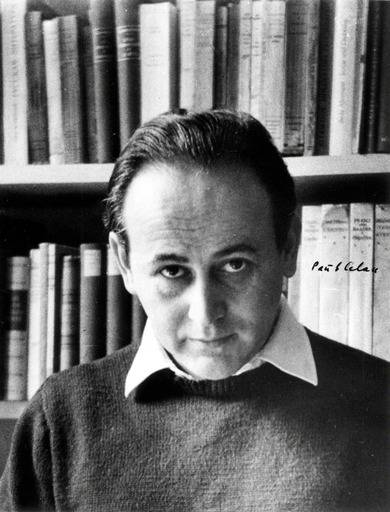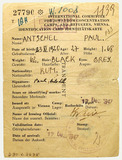Paul Celan(Paul Antschel, Paul Ancel)
Paul Celan(Paul Antschel, Paul Ancel)
Wenn es etwas gibt, was dieser Aufenthalt mich einmal mehr gelehrt hat, so ist es dies: die Sprache, mit der ich meine Gedichte mache, hat in nichts etwas mit der zu tun, die hier oder anderswo gesprochen wird [...]. Wenn es noch Quellen gibt, aus denen neue Gedichte (oder Prosa) hervorsprudeln könnten, so werde ich sie nur in mir selber finden und nicht etwa in den Gesprächen, die ich in Deutschland mit Deutschen auf Deutsch führen könnte. Dieses Land, ich mag es überhaupt nicht.
[If there is anything that this stay has taught me once again it is this: the languages with which I make my poems has nothing to do with that which is spoken either here or elsewhere [...] If there are still founts from which new poems (or prose) can spring forth, I will only find them within myself and not in the conversations that I could have in Germany with Germans in German. This country, I do not like it at all. (ed. trans.)]
Paul Celan in a letter to his wife Gisèle Celan-Lestrange 26 September 1955
| Born | on 23 November 1920 in Czernowitz, Romania, today Ukraine |
|---|---|
| Died | on 20 April 1970 in Paris, France |
| Exile | France |
| Profession | Writer |
Paul Celan grew up in a German-speaking, Jewish family in Czernowitz in Romania. His childhood in the Bukovina region was shaped by a multicultural, multi-ethnic state. The later nom de plume Celan is a Romanianised anagram of his actual surname Antschel. In summer 1940, the northern part of Bukovina, and thus also Celan's home city, was occupied by the Soviet Union. The southern part of Bukovina remained under Romanian control. In 1941, the Soviet-occupied part of Bukovina fell under Nazi control following attacks by German and Romanian troops. In Czernowitz, the Jews were then forced into a ghetto. Celan's parents were later deported to a camp in Transnistria; Celan's father died of typhoid fever, and his mother was shot. Celan himself was forced into labour building roads in the south of what is today the Republic of Moldova from 1942 to 1944. After the liberation of Czernowitz in 1944, he returned to the city, moved to Bucharest in 1945 and fled from the communists via Hungary to Vienna and later Paris, where he lived until his death.
The murder of his parents, fear of the communist dictatorship and the destruction of Jewish culture in Bukovina had compelled Celan, his homeland obliterated, to flee. In his texts he returned repeatedly to this motif of the foreign, the crossing of boundaries and the experience of permanent exile.
As a German-language author and translator, Celan's texts initially found little favour in the literary circles of the Federal Republic: his writer colleagues in Group 47, to whose reading he was invited in 1952 at the behest of his sometime partner Ingeborg Bachmann, considered the language of his verse too full of pathos; he was defamed at some of his readings, and even his most famous poem Todesfuge – a reckoning with the murder of European Jews – met with disapproval.
Nevertheless, in 1952 Celan achieved a measure of acclaim in West Germany with his collection of poems Mohn und Gedächtnis. He received numerous important literature prizes, including the Georg Büchner Prize in 1960. After becoming a French citizen in 1955, in 1969 he travelled for the first time to Jerusalem and worked his impressions from the trip into a collection of poems, Zeitgehöft (1976), which was published posthumously. In 1970, Paul Celan took his own life in Paris.
Selected works:
Der Sand aus den Urnen (poems, 1948)
Mohn und Gedächtnis (poems, 1952)
Von Schwelle zu Schwelle (poems, 1955)
Sprachgitter (poems, 1959)
Atemwende (poems, 1967)
Further reading:
Emmerich, Wolfgang: Paul Celan. Reinbek bei Hamburg: Rowohlt 1999
Felstiner, John: Paul Celan: Eine Biographie. München: C.H. Beck 2. Auflage 2010
Hurna, Myron: Einführung in die Lyrik und Poetik Paul Celans. Oberhausen: Athena 2011
May, Markus / Goßens, Peter / Lehmann, Jürgen (Hg.): Celan-Handbuch. Leben, Werk, Wirkung. Stuttgart: J. B. Metzler 2. Auflage 2012


